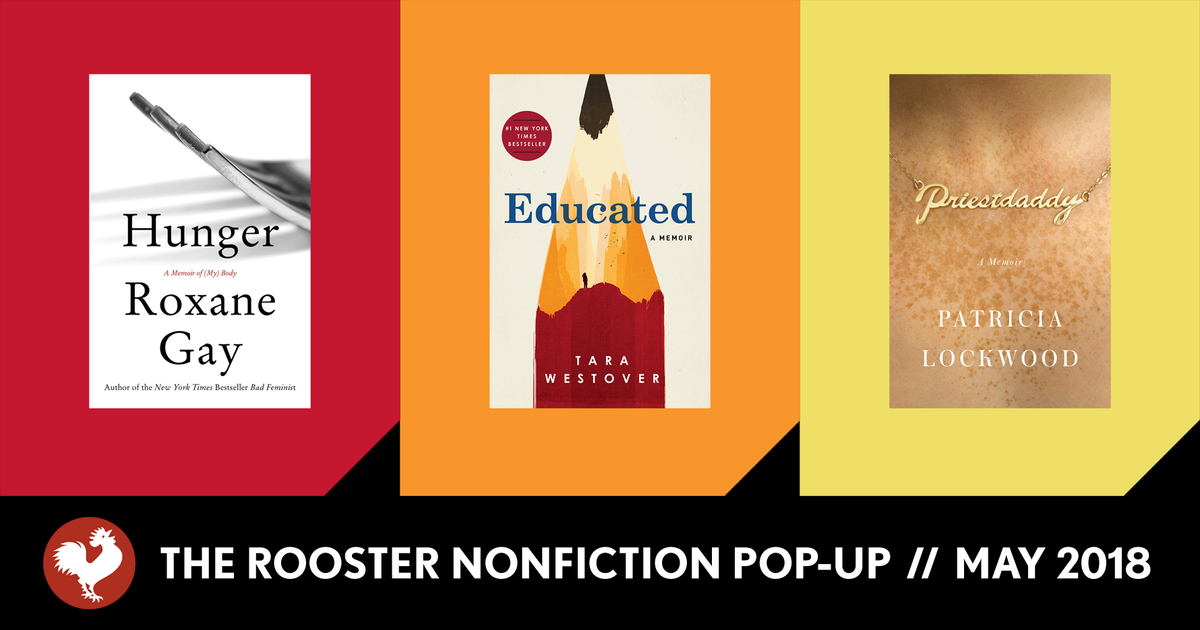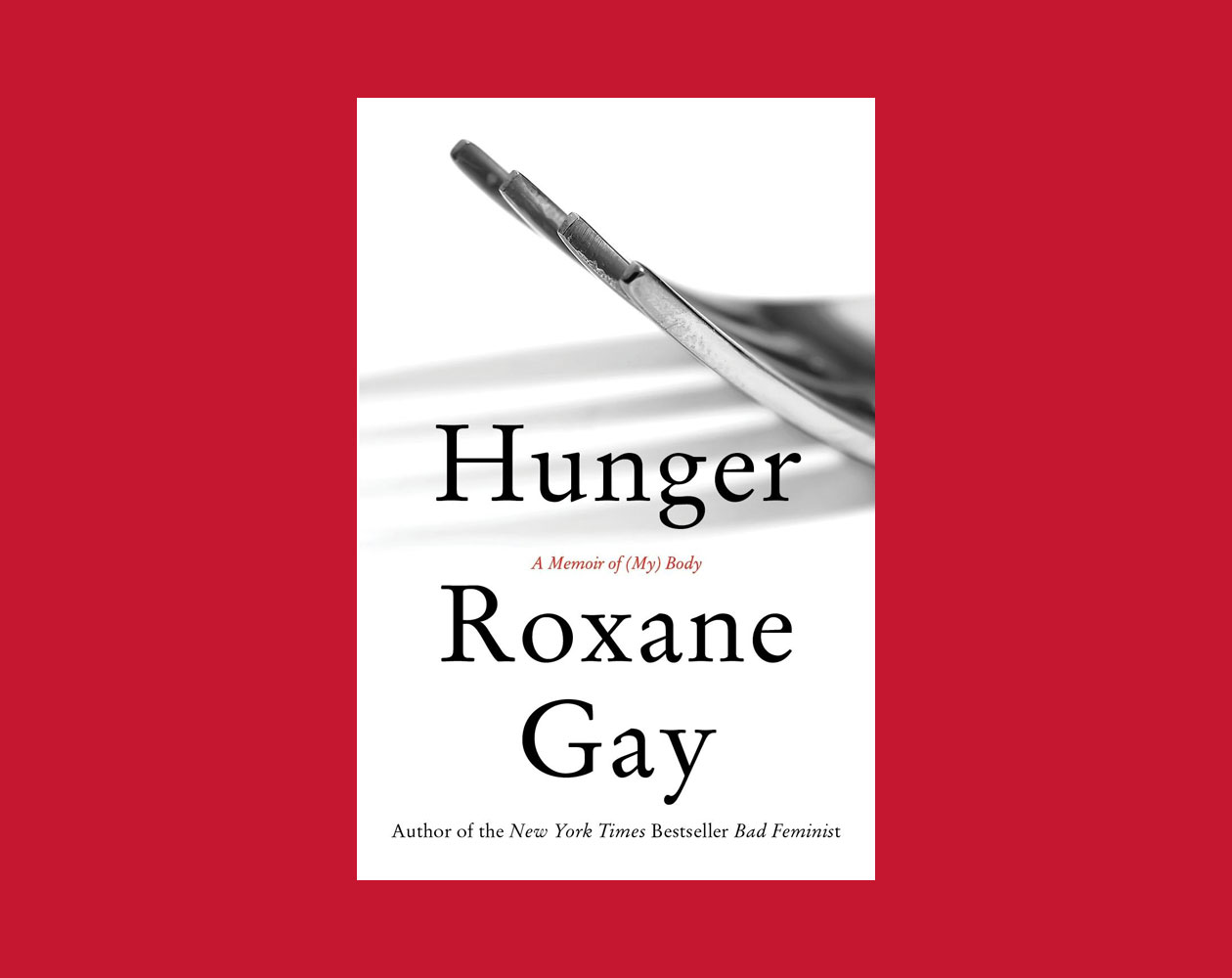The Rooster Nonfiction Pop-up: Hunger, Second Half
Our first-ever Tournament of Books nonfiction event continues. Today we talk with author Sarah Hepola about the conclusion of Roxane Gay's astonishing memoir.

Welcome to our first-ever Rooster Nonfiction Pop-up, brought to you by the organizers of the Tournament of Books.
All month long we’ll be discussing three recent works of nonfiction. To choose which books we’re reading this month, we asked this year’s ToB readers for suggestions back in March. We narrowed that list down to a single genre—memoir—and our readers voted to decide which three books we’d read for this event, and here they are: Hunger by Roxane Gay, Educated by Tara Westover, and Priestdaddy by Patricia Lockwood. You can see the full list of nonfiction contenders here.
Unlike the Tournament of Books and the Rooster Summer Reading Challenge, the Rooster Nonfiction Pop-up isn’t a competition—only a discussion about these three memoirs. Every Tuesday and Friday in May we’ll meet up to talk, and we’ll be teaming up with Sarah Hepola, author of the New York Times bestselling memoir Blackout: Remembering the Things I Drank to Forget. Grab some books and join in the fun!
- See the May 2018 nonfiction reading schedule
- Catch up on previous chats: Hunger (first half)
- Jump into today’s discussion in the comments
Please note: We receive a cut from purchases made through the book links in this article.
Andrew Womack: I’d say there’s no better way to start today’s discussion than with Roxane Gay’s tweet last week about the wedding of her trainer, Tijay, who, coincidentally, we meet at the beginning of Hunger’s second half.
Guys. Tijay, my Indiana trainer got married to another trainer. They had an exercise themed wedding. Instead of table numbers the tables had names like Burpee and Curls and so on. He carried her into the reception while doing a squat. I.... I....April 30, 2018
Sarah Hepola: Congratulations, Tijay. I hope you got all the kettlebells you registered for, and that the reception had tons of mustard.
Sarah Hepola is the author of the bestselling memoir, Blackout: Remembering the Things I Drank to Forget. Her writing has appeared in the New York Times, The Guardian, Elle, Glamour, BuzzFeed, Jezebel, and Salon, where she was an editor. She has been a contributor to The Morning News for more than a decade. She lives in Dallas, and she is currently working on a second book. Please don’t ask her about it.
Andrew Womack is a founding editor of The Morning News.
Andrew: In the second half of the book, her family really comes to life. Earlier on we began learning who they are, their names and relation to her, and we know they love her—especially her father, as he’s the first one we get much exposure to. But it’s really deeper in, when we start to experience her mom’s Haitian cooking or her dad’s familial devotion or her brothers’ teasing that they become characters that were only hinted at before. In terms of nonfiction, these characters are entirely realistic. However, it’s something about nonfiction that frequently irks me—when unbelievable characters enter the narrative. There’s a delicate balance in the storytelling, I feel, in how far nonfiction characters go in being absolutely true to life.
Sarah: Right. I’m annoyed by very eccentric characters, but then I wonder sometimes if that’s some kind of professional jealousy, because I don’t have larger-than-life characters wandering around my corridors with their mink coats and their thick Southern accents. Like you say, Roxane’s family plays a small but crucial role here. We know from the beginning that they love her, and she loves them, but somehow this love became…complicated. After the rape, she refused to tell them, and she gets caught in a spin-cycle of defiance and anger turned inward.
I found one of the most poignant things to be the ways she seemed to be trying to tell them—to tell them without telling them. First there’s the dramatic weight gain at boarding school. Then she writes a play about sexual violence. Lastly, she disappears from Yale. That really startled me. She just up and bolted for like a year, and she thinks her family hired a private investigator to track her down. I said earlier I wanted more about her time working at a phone sex line, but in general, I thought this whole section on her “lost 20s” went too quickly. I wanted her to slow down. I wanted to understand this part of her story better. Then again, she says more than once that it was the worst time in her life, and she doesn’t understand what happened, so maybe she’s being true to the experience to speed past it.
It was an interesting choice not to describe her family until deep into the book. We know from the first few pages that Roxane is six-three, and at her heaviest, she weighed 557 pounds. But it’s not until the last third that we learn her mother is quite petite, and that Roxane feels like “the fat one in the beautiful family.” Usually in a memoir, you’d place this description early in the book, to explain a sense of alienation. She saves it until much later, but the information still has impact. After all we’ve learned about the challenges this woman faces, she feels out of place even in her family.
I must say, writing about my own family was one of the hardest parts of my own book, and definitely one of the most anxiety-inducing. I had purposefully excised my family from personal essays; not because they aren’t important to me, but because they are. I didn’t want to drag them into the spotlight, or bring unwanted scrutiny. Writing about other people freaks me out, in a way that writing about myself does not. Something about my terror of hurting other people, and not being all that worried about hurting myself.
Andrew: We talked about the direct, no-bullshit style of Hunger last time, and I feel like it helps the book function—though I know it’s not supposed to—as a kind of self-help book.
Sarah: Writers tend to flail about like someone flicked battery acid in their face if “self-help” is used to describe their work, but look: Most of us became a writer because books helped us, and we would like to write books that help other people. Readers do look to books for moral guidance—how to be more aware, compassionate, how to lead our lives. And the act of reading about someone else’s struggles is enormously helpful—not only do we get to identify with them, but also we learn about experiences we’ve never had. There is a scene I will never forget, where Roxane is trying to get up up onto a stage in an auditorium for a panel, and she can’t hope up so this guy has to awkwardly pull her, and then she takes a seat on a small wooden chair and hears it crack. She basically has to crouch on that chair for the entire event. Harrowing.
One of the problems with the self-help genre is that it’s exclusively interested in the cure. This book is mostly interested in the struggle. That can make it a frustrating read. My awesome all-female book club read Hunger a few months ago, and a couple members were put off by the lack of resolution. Roxane never slays the dragon, although I would argue her ability to convey that battle—in all its endless, writhing complexity—is a triumph on its own. I also think if we only tell stories about people who slay the dragon, then we might unintentionally give the impression that dragons are quite easy to slay, when nothing could be further from the truth. Dragons are beastly! They devour whole villages! The story of a woman living in a body that can feel unbearable is a hell of a lot more common than the story of a woman transforming that body to something featured on the cover of a magazine.

“With the bracing candor, vulnerability, and authority that have made her one of the most admired voices of her generation, Gay explores what it means to be overweight in a time when the bigger you are, the less you are seen. Hunger is a deeply personal memoir from one of our finest writers, and tells a story that hasn’t yet been told but needs to be.” (Amazon / IndieBound / Powell’s)
Book description excerpted from publisher’s summary and edited for length.
Andrew: It seems obvious to say, but so much of the power of nonfiction for me is that what I’m reading (or at least some version of it) really did happen. And when I read it that way, when I remove the distance I can often keep when reading fiction—it’s just a book!—then what happens in the book is so genuinely crushing to me.
Sarah: There’s real power behind the idea that: It happened to me. I get into these esoteric conversations with other memoir writers about the nature of truth, and how can we ever know a thing, and whether our subjective experience can be true, etc. etc., but what makes a memoir ultimately is: These things happened. That’s why James Frey created an uproar, because people bought that book based on the notion that these things happened and then…they had not.
Not long ago, I read She’s Come Undone by Wally Lamb. It’s a novel about a girl who—well, I don’t want to give too much away, but the main character Dolores Price goes through many of the experiences that inform Hunger. Dolores is incredibly vivid, complicated, exasperating. She feels real. But she isn’t. When I finished that book, Dolores Price’s story was done, but when I finished Roxane Gay’s book, she was out there on Twitter, kicking ass, still negotiating cramped airplane seats and small wooden chairs. Memoir is this fascinating unfinished project, because these people are still going, learning, evolving, and I can tell you as someone who writes in the genre that our ideas about ourselves and our experiences continue to change. I’ve come to think of a memoir as something like a snapshot: me, at one time.
I get asked by fiction writers: How can you just stand up there so nakedly and talk about what happened to you? And maybe my answer is: I don’t know how to write anything better. I wish I wrote more fiction, and I do hope I write a novel one day. But maybe my answer is also: It’s not that hard for me, I kind of enjoy it. I’ve thought a lot about how Lena Dunham felt really comfortable taking off her clothes on Girls, and you couldn’t pay me enough money to strip on HBO, but I do feel comfortable getting up in front of people and saying: This happened to me. This is how it felt. I don’t know—it keeps things interesting when you tell the truth about your life.
Andrew: That was also the case for me with Blackout. When I saw you at your reading in Austin when the book was published, and heard you read that section about coming out of a blackout to find you were having sex with a stranger in Paris, I was overcome with such palpable fear at what you’d been through, that—as you may recall—I just broke down in tears. I guess it’s all to say, that if you’d been reading your novel and your character had the same experience, I wouldn’t have come away with the feeling: I’m so glad you are alive and OK.
Sarah: I remember you crying at my reading. That was an intense moment. I thought maybe you felt guilty, because you and your wife Melissa were two of my closest friends during my years in New York, and I used to go to your apartment and drink red wine and pass out on your couch. I thought maybe you felt like you should have known those dark things happened, but of course you couldn’t have known, because I didn’t tell you. I think this is what ultimately draws me to memoir: All of us are walking around with stories we have never told anyone. And when someone says, “Here are those stories,” I’m all in.
I just thought of something. This is a theory, but I wonder if part of the memoir impulse is about wanting strangers to carry the burden of a painful experience, to lighten the load in a way. Memoir writers tend to be big on feelings, and that can be overwhelming. I know that writing about the experience lets it cool down—gives you control of a narrative that was out of your control—but maybe it also lets you offloads some of the grief. Huh. I don’t have many emotions around that episode in Paris now. Is that because even our most mortifying events fade with time? Or because I wrote about it and transformed it into a story in a book? Or because I shoved it out into the world and let readers feel it for a while? Mysteries, mysteries.
Andrew: Gay’s exploration of boundaries—about, for example, how people want to hug her even though she tells them she doesn’t want to—this really stuck with me. Not in a personal way, but really it came down to this amazing line, which, let’s just talk about it: “Why do we view the boundaries people create for themselves as challenges? Why do we see someone setting a limit and then try to push it?”
Sarah: I highlighted that passage, too. I actually felt a little indicted by that section, because I’m a toucher, and a hugger, and I have a strong suspicion I have placed hands on a reluctant stranger and said, “See? That’s not so bad.” So what was I doing? Well, I was trying to connect, spread a good feeling, assure someone they weren’t alone. But maybe my attempt was clumsy. It failed to acknowledge that I was trying to connect with someone in a way they didn’t want to connect. It’s like when I tell someone I don’t drink, and they say, “Come on, just one!” No, none. It’s not a debate.
Of course this has resonance in sexual dynamics. I think a lot of us were raised to believe sexual play was a game of cat and mouse, where one person draws a line and the other one plots and schemes to step over it. It’s only in the last five years or so years that I’ve heard people say: Enough of that. When someone sets a limit, respect it. For a long time, pushing limits was understood to be part of the erotic game, but we’ve spent the past few years now seeing the damage that can be created by that attitude. Maybe we’re starting to see a cultural change, and if so, that has to do with a lot of women talking about these issues, including Roxane Gay.
Andrew: Near the end of the book, when she’s talking about feeling passive about gaining notoriety for her novel, she says, “I was a little resentful that when a woman writes, her personal story becomes part of the story, even though the novel is fiction.” I feel this is so true and such an important point for fiction readers to bear in mind, but I would love to hear if that’s an experience you can relate to.
Sarah: I can’t, because I’m a woman who placed her personal story front-and-center, so it would be pretty cheeky of me to complain now. But I know this is an issue for other writers, both journalists and fiction writers, and I imagine it’s very frustrating. For fiction writers it’s this constant drumbeat of: How much of this character is you? Then for journalists, it’s: Where are you in this story? Can we get more of your voice? That’s very annoying for the narrative journalist who is trying to disappear.
I do think Roxane’s case was complicated by the fact that her novel “An Untamed State” came out at the same time as “Bad Feminist,” which was a blockbuster and made her a literary celebrity. Once someone has celebrity, it gets harder to separate the work from the public personality, though I appreciate she is making a broader point about women and art.
One day, I’m going to write a very serious novel about, like, orphans in Eastern Europe, and people are going to say: But which one is you? And then I will have a better answer to your question.
Rosecrans Baldwin: Thanks, Andrew and Sarah. Everybody else, we’ll see you in the comments, and then back here on Friday, May 11, for our discussion of Tara Westover’s Educated, through part one.

